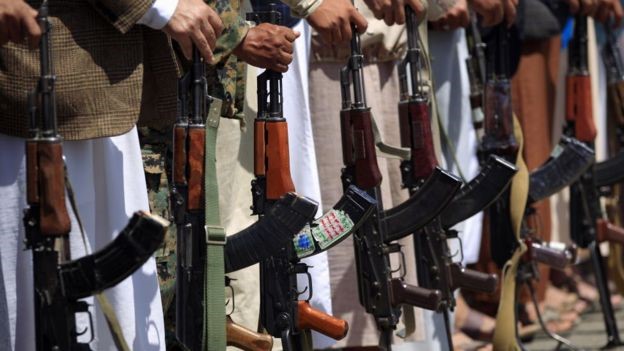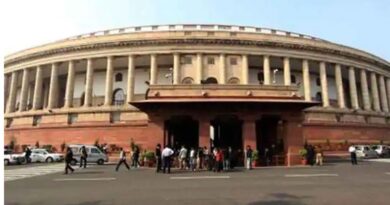Why did Britain give arms to Saudi Arabia and why are these deals in dispute?
Yemen’s civil war has now entered its fifth year and the number of deaths of civilians in violence is increasing continuously here. In such a situation, there is increasing pressure on Britain for its decision to sell arms to Saudi Arabia.
How are these three countries connected?
Saudi Arabia is the largest buyer of weapons in the world, rich in the natural wealth of crude oil. He is leading an air campaign aimed at defeating rebels in neighboring Yemen, the country’s poorest country in Arabia.
In a report released last year, Britain described itself as the second largest arms seller in the world. According to an estimate, Britain has sold more than 40 percent of its weapons to one country, that is Saudi Arabia.
According to a report of the British government released in 2019, the United Arab Emirates, the friend of Saudi Arabia in the Yemen war, also tops the list of arms buyers from Britain.
Britain lags behind only the United States in international arms trade.
What is the situation in Yemen?
On the one hand, human rights activists and British opposition leaders are now raising questions about the effect of this booming arms trade of billions of British pounds on Yemen.
On the other hand, the United Nations says that Yemen has faced the world’s worst humanitarian crisis.
According to the United Nations, at least 7,700 ordinary civilians have died in Yemen in Saudi Arabia-led air strikes by March 2020.
Other monitoring groups monitoring Yemen’s situation say that this data is much more than this.
According to the US-based Armed Conflict Location and Event Data (ACLED), as of December 2019, at least 100,000 deaths have been reported due to violence, including 12,000 civilians killed in the attacks.
80 percent of Yemen’s population, or 240 million people, need humanitarian aid and protection.
According to an estimate, 20 lakh children are suffering from severe malnutrition here, including about 360,000 children below the age of five years.
What does the British government say?
Last year, human rights activists in Britain were able to register a major victory when, through a court order, they succeeded in stopping arms exports to Saudi Arabia.
The activists asked the British government to review its policy related to the arms agreement, whether there was a serious violation of international law in Yemen.
Nearly a year after this, the government reached the conclusion that it would resume the sale of arms.
International Trade Minister Liz Truss acknowledges that there have been separate incidents of human rights violations, but added that “Saudi Arabia intends to abide by international human rights laws and has the ability to do so.”
In a written statement to MPs, he said, “The incidents that have been evaluated for possible violations of human rights have occurred at different times, under different circumstances and for different reasons.”
What do critics say?
Labor Party leader Emily Thornberry is also the opposition’s spokesperson in international trade. He described the government’s decision as “not morally defensible” and said it was like undermining Britain’s “claims of a country protecting human rights”.
The Campaign Against Arms Trade (campaign against the arms trade), which took the court’s stand in this regard last year, called the decision a “morally hollow” decision.
Airwars, a UK-based monitoring group that monitors ordinary civilians killed in air strikes in the Middle East, believes the government’s decision to sell arms to Saudi Arabia is not correct.
The group claims that apart from Saudi allies, the statistics of Britain’s own air strikes have been under question.
In its plea, this group speaks of the airstrikes for five years in a campaign against the alleged Islamic extremist group Islamic State.
“The scale of the investigation in Britain has been set at such a high level that it would be almost impossible to prove the harm of ordinary citizens,” says Airwars.
The British military has used “4,400 weapons against the Islamic State” as part of the US-led military alliance, according to figures from the British government.
Britain says that the Royal Air Force is responsible for the death of a common citizen.
According to Airwars, between 8,000 and 13,000 civilians have died during this period. He says Britain’s way of finding out how many ordinary civilian casualties have occurred is “absurd”.
How much money arms deal?
The Campaign Against Arms Trade (CAAT) says that Britain has licensed weapons worth £ 5.3 billion to Saudi Arabia since the start of the Yemen war in 2015.
According to the CAAT, in the same years, additional billion-dollar arms deals were licensed to Saudi Arabia’s other allies in the Gulf. These Saudi Arabian allies have also been part of the campaign against Yemen.
But the CAAT also believes that these figures do not include arms deals that were carried out under open licenses. In addition, the UK’s leading security company BAE in Saudi Arabia has overseen, technical and other Features provided, redeemed The benefit of going is not mentioned.
CAAT believes the Saudi-led coalition has been ‘at least 16 billion pounds’ since the war began.
The weapons sold include Typhoon and Tornado fighter jets as well as bombs known for their precise targets.
British officials have also given advice to the Saudi coalition on bombing and have also given training to Saudi army personnel in Britain.
Has Britain only sold weapons?
It is not that only Britain has signed an arms deal with Saudi Arabia. To be fair, the stock of Britain is very less compared to America.
According to the Stockholm International Peace Research Institute (SIPRI), from 2015 to 2019, 73% of the weapons imported to Saudi Arabia have been imported from the US. In this case, the second place is from Britain, which has contributed a total of 13 percent. France is in third place. 4.3% of the weapons Saudi Arabia has got from France.
SIPRI Senior Researcher Peter de Weizman says that in the last five years, half of the weapons exported from the US to the Middle East have been exported to Saudi Arabia alone.
Saudi Arabia and its ally United Arab Emirates called Donald Trump “a deterrent against the malicious acts of Iran and its representatives in the region.”
The Houthi rebels in Yemen are believed to have Iran’s support in the struggle against Saudi Arabia, although Iran has denied this.
What is the future?
Britain’s Foreign Minister Dominic Robb wrote in an article in the Financial Times that Britain had tried to establish peace in Yemen and provide humanitarian aid.
He further wrote that in addition to the ceasefire in Yemen, Britain, Germany and Sweden are jointly committed to provide $ 306.5 million in aid to the United Nations so that it can provide humanitarian aid in Yemen.
In addition to cholera, Yemen is also struggling with the problem of corona. Only half the hospitals in Yemen are able to function fully.
In April, Saudi Arabia declared a unilateral ceasefire due to the corona virus epidemic. But the Houthi rebels rejected the ceasefire and demanded an end to air and maritime blockades in the capital Sanaa and Hudaidah.
At present, the situation of the blockade remains and the United Nations has warned that the consequences of war can lead to more serious consequences.
The United Nations has said, “The total number of people who die from the corona virus may be higher than those who died of war, disease and hunger in the last five years.”




